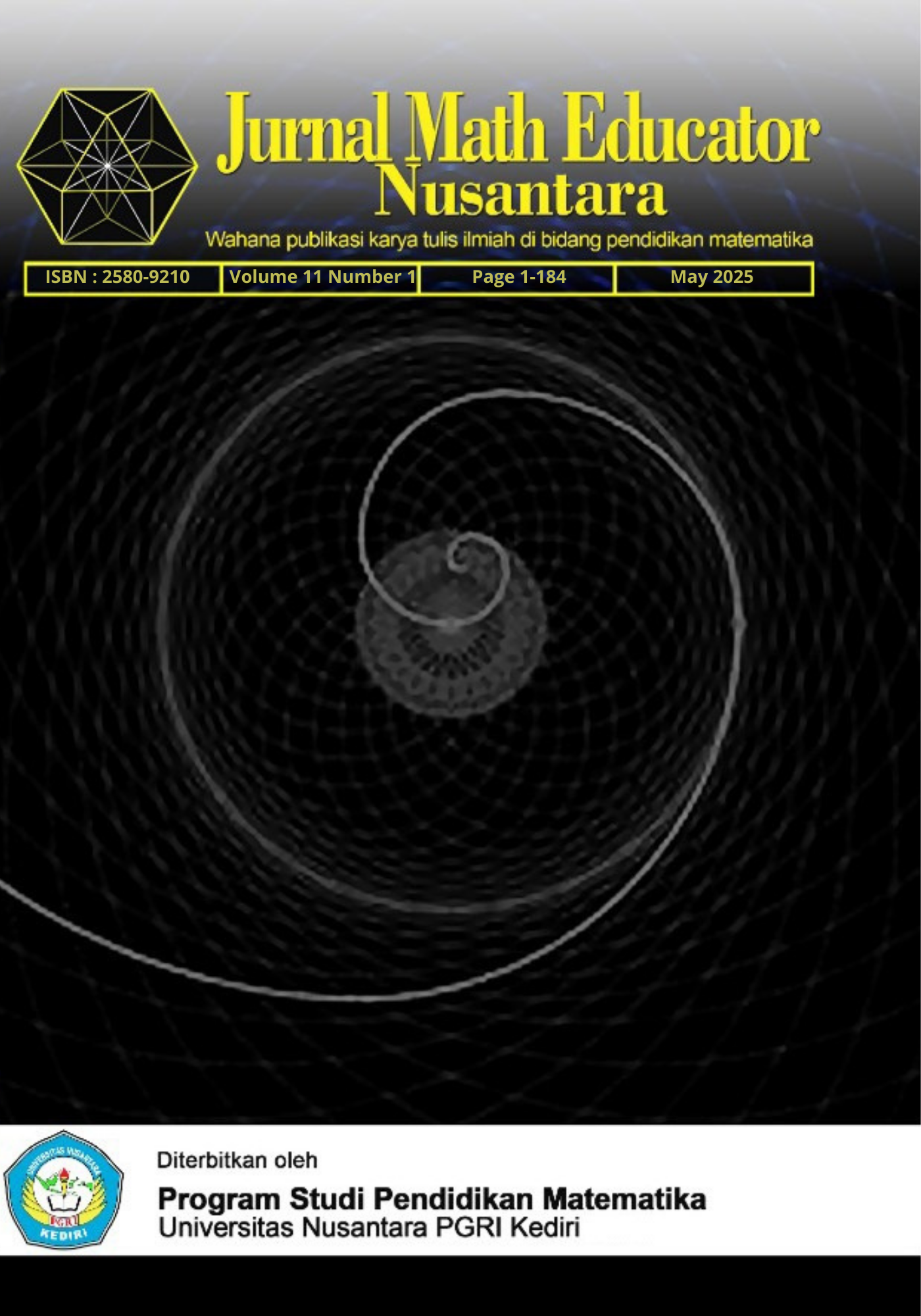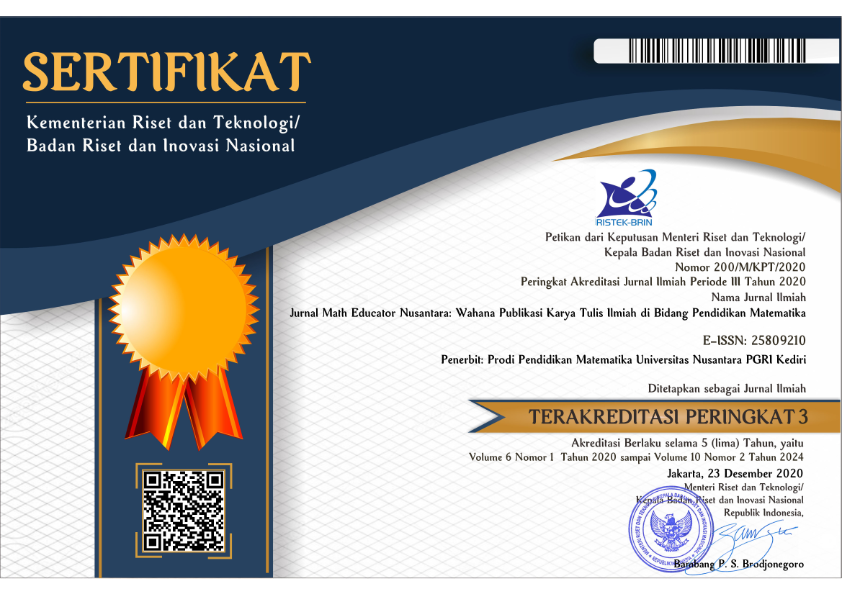The role of constructivist philosophy in arithmetic learning using the brainingcamp application
DOI:
https://doi.org/10.29407/jmen.v11i1.23795Keywords:
Brainingcamp, constructivist learning, virtual manipulatives, arithmetic, elementary schoolAbstract
This study aims to evaluate the impact of using the Brainingcamp application in improving the understanding of arithmetic concepts among fourth-grade students at Islamic Leader School in Tasikmalaya City through a constructivist approach. The research employs a case study approach with qualitative descriptive design, involving 22 students as research subjects during the first semester of the 2024/2025 academic year. Data were collected through classroom observations, written tests (pre-test and post-test), and interviews with students and teachers. Qualitative data were analyzed using thematic analysis, while quantitative data were analyzed using descriptive statistics. The results show a significant improvement in students’ average scores after using Brainingcamp, with increases of 17.6% in addition, 18.8% in subtraction, 24.3% in multiplication, and 30.8% in division. Observations and interviews also reveal that students became more active, motivated, and collaborative during the learning process. The use of virtual manipulatives supports the principles of constructivism, aligning with Piaget’s and Vygotsky’s theories by providing opportunities for students to build their own understanding through visual exploration and social interaction. Based on these findings, Brainingcamp proves effective in enhancing both conceptual understanding of arithmetic and student engagement, although this study has limitations in terms of sample size, duration, and generalizability. Therefore, it is recommended to replicate the study with a larger and more diverse population and extend the duration of implementation in future research.
References
Akbıyık, M., & Tavil, Y. Z. (2024). Virtual manipulatives and instructional strategies for teaching mathematical concepts and skills to students with special needs. International Online Journal of Education and Teaching (IOJET, 11(4), 797–811. https://iojet.org/index.php/IOJET/article/view/2136
Bada, & Olusegun, S. (2015). Constructivism Learning Theory: A Paradigm for Teaching and Learning. IOSR Journal of Research & Method in Education (IOSR-JRME, 5(6), 66–70. https://doi.org/10.9790/7388-05616670
Bito, N., & Masaong, A. K. (2023). Peran Media Pembelajaran Matematika sebagai Teknologi dan Solusi dalam Pendidikan Di Era Digitalisasi dan Disruption. Jambura Journal of Mathematics Education, 4(1), 88–97. https://doi.org/10.34312/jmathedu.v4i1.17376
Braun, V., & Clarke, V. (2006). Using thematic analysis in psychology. Qualitative Research in Psychology, 3(2), 77–101. https://doi.org/10.1191/1478088706qp063oa
Febindayanti, A., & Sinaga, B. (2024). Analisis Pemahaman Konsep Matematika Siswa Dalam Penerapan Pembelajaran Berbasis Konstruktivisme. Indonesian Journal of Education and Learning, 8(1), 70–76. https://doi.org/10.31002/ijel.v8i1.2073
Husein, N. (2019). Brainingcamp: Easiest manipulatives for your digital classroom. https://www.clever.com/blog/2019/01/brainingcamp-is-available-in-the-clever-library
Lathifah, A. S. (2024). Pemanfaatan Teknologi Digital dalam Pembelajaran Konstruktivisme: Meningkatkan Kualitas Pendidikan di Era Digital. Jurnal Pendidikan Dan Kebudayaan (JURDIKBUD, 4(1), 69–76. https://doi.org/10.55606/jurdikbud.v4i1.2838
Molita, A., Widiyanto, R., Ariyanti, G., & Dian, M. (2024). Penerapan Strategi Pendekatan Culturally Responsive Teaching (CRT) dalam Pembelajaran Berdiferensiasi untuk Meningkatkan Hasil Belajar Matematika Peserta Didik Kelas XII-5 SMAN 6 Surabaya. JCS: Journal of Comprehensive Science, 3(10), 4513–4522. https://doi.org/10.59188/jcs.v3i10.2086
Muwakhidah. (2020). Konstruktivisme Dalam Perspektif Para Ahli: Giambattista Vico, Ernst Von Glasersfeld, Jean Piaget, Lev Vygotsky dan John Dewey. PD ABKIN JATIM Open Journal System, 1(2), 115–125. https://doi.org/10.1234/pdabkin.v1i2.92
Muyassar, M. R., & Harahap, E. (2020). Pembelajaran Aritmatika Menggunakan Aplikasi Wolfram Alpha (Arithmetic Learning Using Wolfram Alpha Application. Jurnal Matematika, 19(2), 25–32. https://journals.unisba.ac.id/index.php/Matematika
Nerita, S., Ananda, A., & Mukhaiyar, M. (2023). Pemikiran Konstruktivisme Dan Implementasinya Dalam Pembelajaran. Jurnal Education and Development, 11(2), 292–297. https://doi.org/10.37081/ed.v11i2.4634
Oktya Rosa, R. (2022). Pengembangan Desain Alat Peraga Permainan Monopoli Berbasis Montessori Untuk Meningkatkan Kemampuan Matematika di MIN 9. http://repository.radenintan.ac.id/17551/
Prabavathy, M., & Sivaranjani, R. (2020). Effects of Virtual Manipulative in enhancing Basic Arithmetic for Students with Developmental Dyscalculia. Journal of Emerging Technologies and Innovative Research (JETIR, 7(6). https://doi.org/10.6084/m9.jetir.JETIR2006343
Sanga, J. F. A. (2023). Teori Konstruktivisme Piaget dan Aplikasinya bagi Pembelajaran di Era Digital. http://repository.iftkledalero.ac.id/1571/
Santoso, G., Permata, D., Guntur, M., Muhammadiyah Jakarta, U., Negeri Tanjung Pandan, S., & Nasional Tanjung Pandan, S. (2024). Peningkatan Pemahaman Nilai Tempat pada Siswa Kelas 3 Melalui Pendekatan Pembelajaran Matematika Interaktif. Jurnal Pendidikan Transformatif (JPT, 3(1), 35–52.
Schmit, M. (2022). The Effective Use of Virtual Manipulatives. https://www.brainingcamp.com/blog/posts/effective-use-of-virtual-manipulatives
Sofiyan, S., & Amalia, R. (2019). Virtual Manipulatives Pada Pembelajaran Matematika Virtual Manipulatives in Mathematics Learning. Jurnal Dimensi Matematika, 1(2), 6–18. https://ejurnalunsam.id/index.php/JDM
Sugiarti Dwi Gita, R. (2024). Pengantar Teknologi Pembelajaran. PT. Literasi Nusantara Abadi Grup. www.penerbitlitnus.co.id
Yakubova, G., Chen, B. B., Al-Dubayan, M. N., & Gupta, S. (2024). Virtual Instruction in Teaching Mathematics to Autistic Students: Effects of Video Modeling, Virtual Manipulatives, and Mathematical Games. Journal of Special Education Technology, 39(1), 51–66. https://doi.org/10.1177/01626434231177875
Yin, R. K. (2018). Case Study Research and Applications: Design and Methods (Sixth ed.). SAGE Publications.
Downloads
Published
Issue
Section
License
Copyright (c) 2025 Elya Elya, Sri Tirto Madawistama

This work is licensed under a Creative Commons Attribution 4.0 International License.
Authors who publish with this journal agree to the following terms:
- Copyright on any article is retained by the author(s).
- The author grants the journal, the right of first publication with the work simultaneously licensed under a Creative Commons Attribution License that allows others to share the work with an acknowledgment of the work’s authorship and initial publication in this journal.
- Authors are able to enter into separate, additional contractual arrangements for the non-exclusive distribution of the journal’s published version of the work (e.g., post it to an institutional repository or publish it in a book), with an acknowledgment of its initial publication in this journal.
- Authors are permitted and encouraged to post their work online (e.g., in institutional repositories or on their website) prior to and during the submission process, as it can lead to productive exchanges, as well as earlier and greater citation of published work.
- The article and any associated published material is distributed under the Creative Commons Attribution-ShareAlike 4.0 International License














